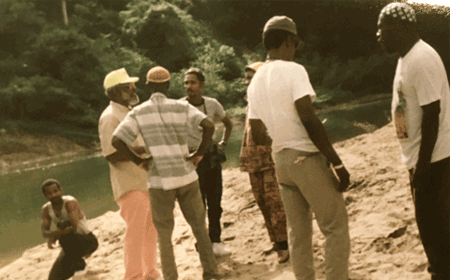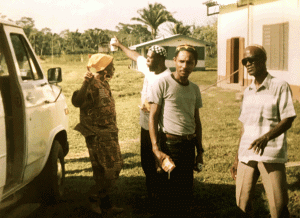The 1980s and 1990s Belize Rural Economic Development of Agriculture through Alliance (BREDAA) work in the More Tomorrow village of Belize Cayo District was aimed to implement youth agricultural development programs as a means of establishing a food security program for Belize’s marginalized and disenfranchised young people across the country, particularly Belize City’s black young men who were being displaced by an insidious so-called war on drugs and an expansive, United Nations-sponsored, Central American refugee land grab that had made them second-class citizens in their own country; that had no land and therefore no birthright to the country as natural born Belizean citizens.
The BREDAA land program that was a brainchild of the legendary Belizean socio-political activist of the United Black Association for Development (UBAD) movement in Belize, Brother Ismail Omar Shabazz, identified the pressing need that Belizeans, especially black Belizeans, needed to hold on to their land and develop food security programs that would have made them self-sufficient in food.
Shabazz also propagated through BREDAA that Belize needed to undergo urgent land reform initiatives, starting with amendments in the Belize constitution and the land laws that made it possible for so much land in Belize to be owned by absentee landlords, most of them living in Britain and the United States. An urgent land reform program needed to be implemented by any government in Belize to acquit these lands from foreigners that were just sitting idle while natural-born Belizean starved because they had no access to land for farming in their own country.
Ismael Shabazz’s pivotal work on land reform was aided by his comrade in struggle in the UBAD movement in Belize, Charles X Eagan better known as “Justice,” who before he passed in the 1990s became Ibrahim Abdullah. A member of the Islamic faith of Belize, Justice was the pioneer of introducing Belize to the work of the Nation of Islam in Belize in the early 1960s.
Justice’s and Shabazz’s work in More Tomorrow from the 1960s and onwards into the 1990s before the origination of BREDAA, started with their acquisition of hundreds of acres of land in the village for the Muslim Community of the 1960s as well as personal lands that they had owned themselves while establishing farms that produced food as a means of sustainable development.
These two men, along with another Nation of Islam Muslim at the time, Brother Rudolph Farrakhan, became leaders for justice and land equality in the village representing the villagers of More Tomorrow in resisting unfair and unscrupulous land taxes by corrupted Belizean politicians of the time. The Belize Muslims would be seen regularly at the Lands and Survey Department in the capital city of Belmopan, Belize, fighting for the return of lands confiscated from village farmers by Belizean politicians who had used their Ministerial powers unjustly to take land already owned by villagers to disperse among their cronies and political stooges who had voted for them in municipal and general elections.
Shabazz, Justice and Farrakhan waged historic battles against the status quo for just land rights in Belize, and continued to do so even up to the deaths of both Justice and Shabazz. Brother Farrakhan, who is now aged and still alive, continues to work with the Islamic Mission of Belize (IMB) in Belize City as an elder in the Muslim Community of Belize.
This brief exposé highlighting the work for land reform and food security in Belize by these three dynamic Belizean Muslim men who had fought for the rights of natural born Belizeans in the village of More Tomorrow must be underscored as an historical piece of land rights history in Belize.
My own work as a member of the BREDAA organization that was later formed in the Los Angeles Belizean Community in the Belizean diaspora came through the education process of both the late Brother Ismail Shabazz and Ibrahim Abdullah, who had also assisted me in acquiring land for myself as a natural born Belizean abroad with rights to land ownership in Belize.
The historical photos come here through the courtesy of the BREDAA archives of the organization’s land reform and agricultural development work for youth development in Belize. It highlights a special visit to Belize from Los Angeles, California in 1993 by myself as BREDAA’s public relations representative, and BREDAA’s chairman at the time, Nuri Akbar. We were given a thorough tour of BREDAA’s More Tomorrow agricultural pilot projects that were financed from the organization’s U.S.-based headquarters.
The visit also included an African-American representative, Sultana Khabeer, who came to see the projects on the behalf of her Nation of Islam group in Los Angeles which had interest in assisting the development of food security programs in Belize that were people and youth centered.
Today it is known that these lands that were acquired in More Tomorrow by Shabazz and Justice for sustainable development and to establish food security programs for Belizean youth are under serious threat by the present Barrow administration.
BREDAA has envisioned an investigation into the status of these lands as the organization’s pledge to these two deceased Belizean activists and their work for land reform in Belize and justice for natural born Belizeans rights to equitable and just land reform in Belize.
(Photos through the courtesy of the BREDAA archives)


